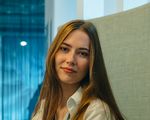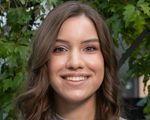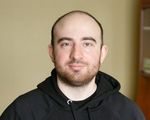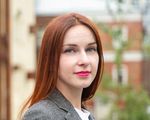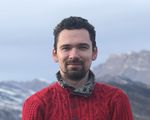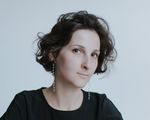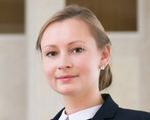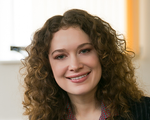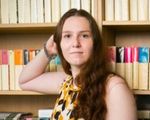About the 'Success Builder' project
How do you find your place in life? How do you find something to do that both comes naturally to you and makes you happy? The answer is that you have to apply the knowledge you’ve gained from university and from life itself correctly. The Success Builder Project features graduates from HSE University who have discovered themselves through an interesting business or an unexpected profession. The protagonists share their experiences, and talk about how they’ve made the most of the opportunities they were given.
Recognized card game masters claim that victory is possible only after making a thorough analysis of the likely combinations contained in your opponent’s cards, making it a literal application of data analytics to game theory. Anastasia Erastova, now a data scientist at the New York office of BNP Paribas, graduated from ICEF with honours and as the Russian vice-champion at bridge. In an interview with Success Builder, she explained why mathematics and gambling often go hand in hand, the advantages of studying next door to Wall Street and how math students can get a work visa in the United States.
Which profession did you see yourself in and did you have a specific goal in choosing a university?
I didn’t have a clear idea of what I wanted to become or which field to work in. At the same time, I was certain I would continue my studies abroad. For this reason, I was attracted by the fact that the instruction was in English, there was an outstanding, world-class teaching staff, and that the programme had been developed in collaboration with the London School of Economics, meaning that it met the highest international standards. At that time, ICEF was one of the few places that offered the possibility of getting a master’s degree and PhD from the best universities in the world. What’s more, the career and academic success of the graduates provided eloquent testimony of this.
Graduates often cite the ‘competitive environment’ at ICEF and HSE University as one of the factors of their success. How would you describe that environment?
The ICEF programme is famous for its outstanding students. My fellow students there were graduates of the best schools in Russia and had won or placed in the most prestigious academic Olympics competitions. What’s more, many were paying for their education out of pocket, even though they could have received scholarships at other HSE departments or other universities. That shows that they were highly motivated and understood exactly why they wanted to be in ICEF.
Actually, you can receive partial compensation for tuition at ICEF when you first enter, or even during your studies if you earn a high enough rating. You would think that would only stiffen the competition and drive the students apart, but it doesn’t work that way at ICEF. The whole time I was there, there was a very friendly atmosphere in which I could always ask for help from my classmates, instructors, staff members or graduates if I was having difficulty with something. Of course, a rating system is an excellent motivator, but when you have such a high-quality culture as you find at ICEF, it only serves as an incentive to study well — and this never devolved into any personal rivalries of any kind.
I came to ICEF from a small private school. Although ICEF is just one part of HSE University, its student body is huge — the programme has 300 students! This was new and unfamiliar for me. But it was easy to adapt. New opportunities and interests arose. It was always possible to find like-minded people with whom I could take part in case study competitions, study projects and even dancing ‘till dawn at nightclubs.
How did you decide that you wanted to further your education, and in mathematics in particular?
I realized early on that I did not want to go into economics after I graduated from university. I was interested in charitable work, but I understood that I would have to return to that later with my accumulated experience and capital, just like Bill Gates did. I considered a career in consulting, tried my hand at case study competitions, and during my third year I signed up for a fantastic class called Abstract Mathematics taught by Alexey Akhmetshin.
That class revealed to me the beauty and versatility of mathematics. At one point, I even regretted that I hadn’t attended a special math school during my final years of high school so that I could have entered the math faculty at university. It was Professor Akhmetshin who helped me choose a master’s programme and gave me the idea of studying quantitative finance — a field that I hadn’t even heard of before that. It wasn’t until later, when I was at New York University (NYU), that I became interested in data science. Then, an internship in quantitative research only reconfirmed my desire to try my hand at data science.
Who should choose NYU Courant Institute of Mathematics and why? What attracted to their programmes?
The question of placement is probably one of the most important aspects you should consider when choosing a master’s programme — that is, the statistics of how many graduates find work, how quickly and in which companies.
NYU Courant is considered one of the world’s best schools for applied mathematics, and you can choose either a PhD programme if you plan to pursue an academic career or earn a master’s degree. I enrolled in the Mathematics and Finance master’s programme. It provides the applied knowledge necessary for work in quantitative finance. I was most attracted by the teaching staff there. Lecturers include some of the most famous people in the quantitative finance industry. These include people such as Bruno Dupire, the originator of the ‘local volatility’ concept that every bank in the world uses. The fact that the university is located in New York City also meant a lot.
Networking plays a huge role in the job search: the fact that NYU is just 15 minutes from Wall Street comes in very handy
Our programme regularly hosted meetings with representatives of major international banks, hedge funds, investment companies and other organizations that were also potential employers. We could invite, say, the director of a bank department out for a cup of coffee and in this way get first-hand information. Surprisingly, they would agree! This was an amazing and incomparable experience.
What role did ICEF’s international reputation play in your application to graduate school and further studies?
Even though many people around the world travel a lot these days, actually relocating long-term to another country is difficult: you have to deal with a completely different reality, culture and language. If you had visited that country as a tourist several times before, believe me, you’ll still be surprised. And if you add to that the shock from intensive studies, then it’s very tough. After ICEF, studying abroad doesn’t seem like something unusual. You’re already used to studying in English, and the familiar format of the educational process helps you adapt quickly.
Because ICEF graduates have enrolled in the world’s best universities for many years, the programme is well-known in both academic circles and the industry. For example, my boss at BNP Paribas (the bank where I work now) Daniel P. Ahn — who headed the Economic Department of the U.S. State Department under Barack Obama — is well acquainted with our university and even came to HSE to present his article on Russia that dealt with the effect of sanctions on the economy.
How can a foreign student remain in the States to work — for example, as part of the STEM programme? (Science, Technology, Engineering and Math, including Computer Science. The U.S. offers a special visa regime for students in these fields. – Ed.)
You might be surprised, but you need to win the lottery to get a U.S. work visa. I’m not joking. So many people want to get jobs in the U.S. that once a year they hold a lottery, the winners of which have the right to apply for an H-1B work visa. Currently, there is a quota of 85,000 such visas. Of those, 20,000 are reserved for people with PhDs or master’s degrees from a U.S. university. The rest is for people from other countries or those who hold bachelor’s degrees. After the first 20,000 are given, the remaining applications from people with master’s degrees are grouped with the rest of the applicants, giving them a ‘second chance’ due to their priority status.
However, studying for a master’s degree allows you to start working immediately after graduation. You are given a one-year permit (the so-called ‘OPT’ — Optional Practical Training, which is a paid internship in the U.S). And if you are included in the STEM programme, then the permit can be prolonged for up to three years. And during these, you can participate three times in the lottery for a work visa, so the chance of winning a work visa increases significantly.
How did you plan to build a career while studying in the U.S.? In general, what do American master’s students usually do towards their careers?
The U.S. has a very well-developed system through which master’s graduates find work. In the fall, large companies start the selection process for summer internships, after which they make an offer to the trainees they like, and those candidates can begin working formal jobs after getting their master’s. In this way, you can devote all the rest of your time to your studies instead of to the job search that would take up an enormous amount of your time and energy. This is especially true of international students, who have only 90 days to receive an offer upon graduation.
In my master’s programme, completing an internship was one of the requirements for receiving a diploma. Those who were still unsure which field they wanted to work in could take internships that offered the possibility of rotating between different teams. For this reason, most U.S. students focus on finding a good internship.
Because I wasn’t very interested in pursuing an academic career, I focused on the internship and knew that I wanted to work with data — especially because all major companies have realized that they can use data analytics to optimize existing processes, as well as to create new ones. Targeted ads are one example of how you can use data. The shortage of good specialists has put them in very high demand, making it is easy to find a job in this field if you are well qualified.
What does a data scientist do? In what does your current employer, BNP Paribas, specialize?
BNP Paribas is a French Bank. I work in the Economic Research Department and the projects in which I’m involved there are very unusual. For example, I created a model for sentiment analysis prediction that analyzes the tone of Federal Reserve meeting texts and produces a single number indicating how positive or negative the Federal Reserve is about the economy. I have also analyzed satellite photos of the Earth’s illumination to predict various economic variables. Various fields from finance to medicine require the work of a data scientist. These specialists work with large amounts of data and train AI and machine learning tools. For example, you can diagnose a disease based on only a few symptoms or predict a country’s GDP based on certain factors.
Why did you decide to study at the Yandex School of Data Analysis after from NYU Courant?
It’s exciting to study in a rapidly changing world. It’s like concentric circles rippling out on the water: the more you learn, the wider your reach and the more choices and opportunities you have. I never even thought about programming when I was in school. It wasn’t until I was a master’s student that I realized what interested me and where my passion lay. That’s why I enrolled in the Yandex School of Data Analysis (YSDA) during my second year at NYU. Why YSDA? It currently offers one of the world’s best programmes for machine learning. The studies are extremely difficult, especially if you combine them with work or a university programme, but also very interesting. They teach highly specialized and in-depth courses in algorithms, mathematics and machine learning. In general, I think the data science profession is not only interesting but also in demand in almost any field — and any country in the world.
What constitutes career success for someone in your field?
For me, success would be either creating a startup or inventing something that makes the world a better place.
You were Russia’s top bridge player while an ICEF student. Have you kept up with this hobby or have you explored other things?
Indeed, many successful bridge players are mathematicians because this is a great way to train the mind, which works even more efficiently in a game setting. In intellectual games such as bridge, an outstanding memory and analytical abilities significantly increase your chances of winning. Before I started my studies at NYU, I received a congratulatory letter from a member of the university’s Board of Directors who pointed out that bridge is the favourite game on Wall Street. In Russia, I was vice-champion, a master of sports and a member of the Junior National Team.
Now I’m taking a small break from my hobbies because work and the YSDA take up all my time. Besides, almost all games have shifted online due to the pandemic. And because I work and study remotely, I try to use whatever little free time I get away from the computer to do physical exercise to stay in shape. But later, I hope to make up for lost time with bridge. Fortunately, you can continue playing bridge to a very advanced age.
Also, I have always had a soft spot for animals and on the very first weekend after starting my new job, I went to the animal shelter and adopted two charming cats — Plushka and Muffin. They are now my main helpers, both in school and work.


